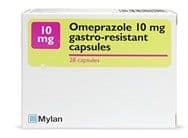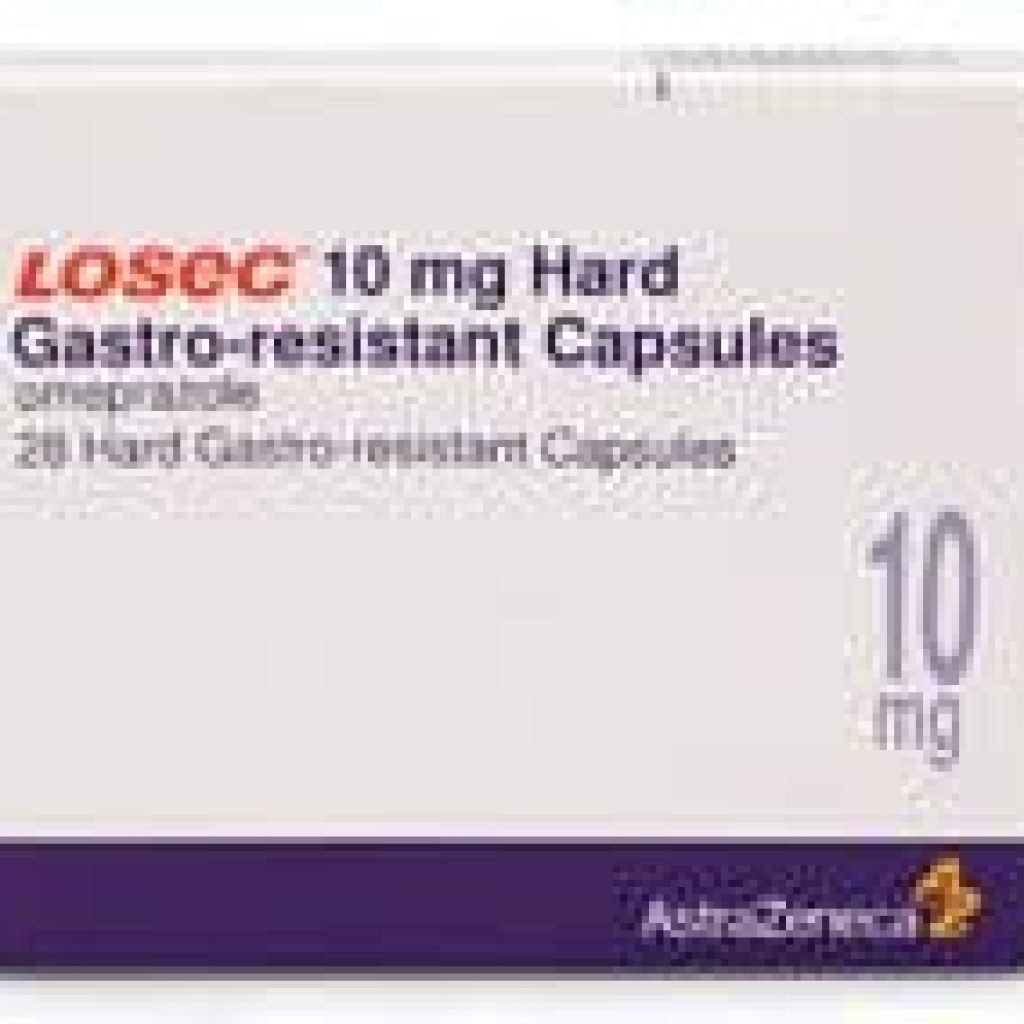Description
Omeprazole is a type of medicine called a proton pump inhibitor (PPI). PPIs have been in use for more than 30 years, and are safe and effective treatments for acid reflux/heartburn and a range of other gastric and duodenal conditions.
In a 2017 review, the authors concluded that all currently available PPIs are effective, and there are only small pharmacological differences in their use.
Further information: NHS – Omeprazole.

Generic omeprazole
Losec is a brand name for a medicine called omeprazole, the active ingredient.
Lower-cost generic Omeprazole 10mg is also available. Generic medicines work in the same way and contain the same quantity of the active ingredient but are usually lower cost than brand-name medicines.
Some preparations of omeprazole 10mg are available over the counter.
How does omeprazole relieve acid reflux/heartburn?
The cells which line your stomach, produce acid, using a specific biochemical process known as a ‘proton pump’. Omeprazole stops the biological action of these pumps – and hence it is called a ‘proton pump inhibitor’ (PPI). These pumps are only active in response to a meal, so omeprazole is most effective when taken within an hour of a meal. Symptoms such as acid reflux and heartburn are reduced by the PPI because the stomach contents become less acidic.
Omeprazole is also effective, when combined with specific antibiotics, in treating H. Pylori. This is a bacterium sometimes found in the stomach and associated with the development of gastritis, gastric and duodenal ulcers, and gastric cancer.
How to take omeprazole
- Take one 10mg capsule once or twice a day.
- Initially, one capsule in the morning, preferably an hour before food if possible.
- Swallow capsules whole, with a glass of water. They should not be chewed or crushed.
- If you have trouble swallowing, open the capsule and stir the contents into a small glass of non-carbonated water, or fruit juice. Then drink the entire contents of the glass within 30 minutes.
- An initial course is up to 4 weeks of treatment.
Who might be suitable for omeprazole?
Omeprazole is licensed to treat adults, aged over 18, with:
- Reflux oesophagitis, treatment, and prevention – commonly known as acid reflux/heartburn.
- Gastro-oesophageal reflux disease (GORD/GERD).
- Duodenal and gastric ulcers, treatment and prevention.
- Zollinger Ellison Syndrome.
- H. Pylori infection.
How soon is omeprazole effective?
It may take 1-2 days to notice an effect from omeprazole. For best results follow the instructions carefully on how to take it – see above or read the patient leaflet supplied in packs.
See a GP if symptoms have not significantly settled after 2 weeks.
Who is not suitable for omeprazole?
The manufacturer recommends monitoring with your GP if you are already taking phenytoin or warfarin-type anticoagulants (requiring regular blood tests).
If taking medication to treat HIV/AIDS or cancer chemotherapy, including high-dose methotrexate, you should not take omeprazole without discussing it with your specialist. Omeprazole may make your treatment less effective.
There are checks in the online consultation to confirm if omeprazole is suitable or may affect other medications taken.
During treatment with omeprazole, if new symptoms develop such as unintended weight loss, vomiting, blood in the vomit, or dark, tarry stools, or persistent diarrhoea you must seek urgent medical attention.
Potential side effects of omeprazole
All medications have the potential to cause side effects but not everyone gets them.
The most common side effects reported with omeprazole (up to 1 in 10 users) include:
- Headache
- Constipation or diarrhoea
- Flatulence
- Nausea/vomiting
- Stomach pains
Sometimes small benign (non-cancerous) polyps can develop in the stomach. These are generally only noticed on endoscopy and disappear on stopping the medication.
Further information is in the manufacturer’s patient leaflet.
Are there any drugs that might interact with omeprazole?
Omeprazole may lead to a decrease or an increase in the levels of certain drugs in your bloodstream.
Omeprazole may lead to a decrease in drug levels in your bloodstream of:
- Nelfinavir, rilpivirine, and atazanavir – for HIV.
- Clopidogrel – to prevent blood clots.
- Dasatinib, gefitinib, neratinib, erlotinib – cancer chemotherapy.
Omeprazole may lead to an increase in drug levels in your bloodstream of:
- Saquinavir and ritonavir – for HIV.
- Tacrolimus – used in organ transplant.
- Methotrexate – a chemotherapy drug.
- Citalopram, escitalopram – for depression.
- Digoxin – for heart disease.
- Diazepam – for anxiety, muscle relaxant or epilepsy.
- Cilostazol – for poor blood supply to legs.
Some drugs may lead to a decrease or an increase of omeprazole in the bloodstream.
Drugs that may decrease omeprazole levels:
- Rifampicin – an anti-TB drug
- St John’s Wort – a herbal remedy for low mood
- Tipranivir – for HIV.
Drugs that may increase omeprazole levels:
- Clarithromycin – antibiotic.
- Voriconazole – antifungal.
Any special warnings/precautions for use?
Losec contains lactose. Most generic brands of omeprazole contain sucrose.
The following have been reported with long-term (over a year) regular use of omeprazole:
- Slight increase in the risk of fractures at the hip, wrist, and spine, hence patients are recommended to follow national guidelines for prevention and treatment of osteoporosis and to have an adequate intake of calcium and vitamin D.
- Reduced absorption of vitamin B12 if taken regularly for more than 2-3 years.
- Low magnesium levels. Symptoms include fatigue, dizziness, delirium, convulsions, and cardiac arrhythmias. More likely if taken with other drugs (e.g. digoxin) which can also lower magnesium levels. Periodic checks of blood magnesium levels may be recommended if taken for longer than 3 months continuously.
- A rare condition ‘subacute cutaneous lupus erythematosus’ (SCLE). Consult your GP promptly if you develop a skin rash on sunlight-exposed areas.
- A slightly higher risk of gastroenteritis such as Campylobacter and Salmonella.
- Possible dizziness, visual disturbances, and muscular weakness – if affected do not drive or operate heavy machinery.
If undergoing investigations or blood tests, inform the doctor or nurse that you are taking omeprazole. You may have to stop it for a few weeks, to prevent it from interfering with the results or from hiding serious conditions during an endoscopy.
Is omeprazole safe in pregnancy and/or breastfeeding?
You must discuss this with your doctor as no medication should be taken in pregnancy unless absolutely necessary. However, no adverse effects have been noted, and omeprazole may be taken in pregnancy and breastfeeding if you are advised to do so.
See also Best use of medicines in pregnancy – omeprazole.
When would taking omeprazole become an emergency?
If you have any symptoms or signs suggestive of an acute allergic reaction (anaphylaxis), you must get medical help immediately (telephone 999 if in the UK).
Symptoms/signs of an acute allergic reaction include:
- Difficulty breathing, tight chest, wheezing
- Swelling of the face, lips, or tongue
- Skin rash – urticaria/hives
- Confusion/collapse/unconsciousness
For more information see NHS – Anaphylaxis.






Reviews
There are no reviews yet.